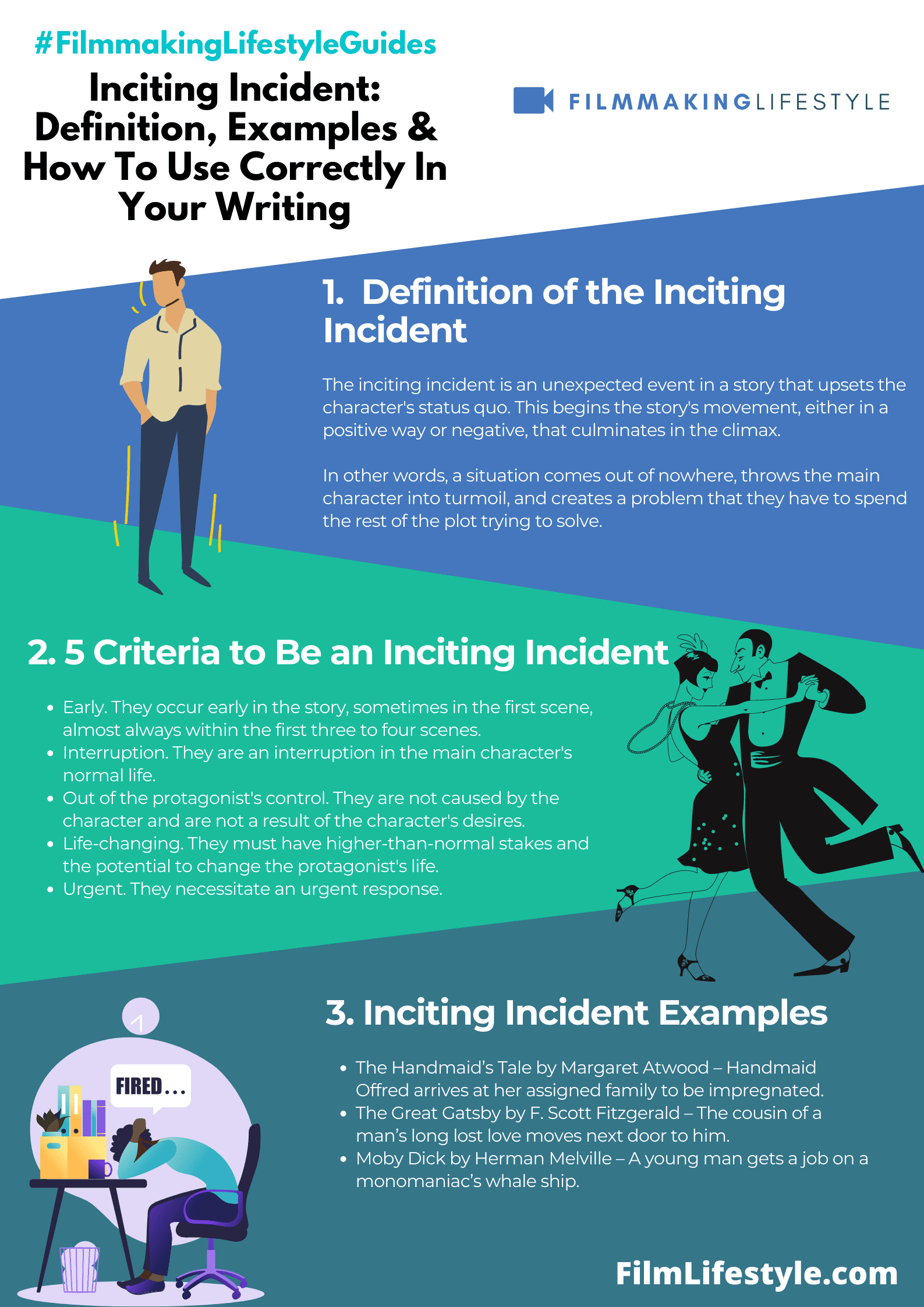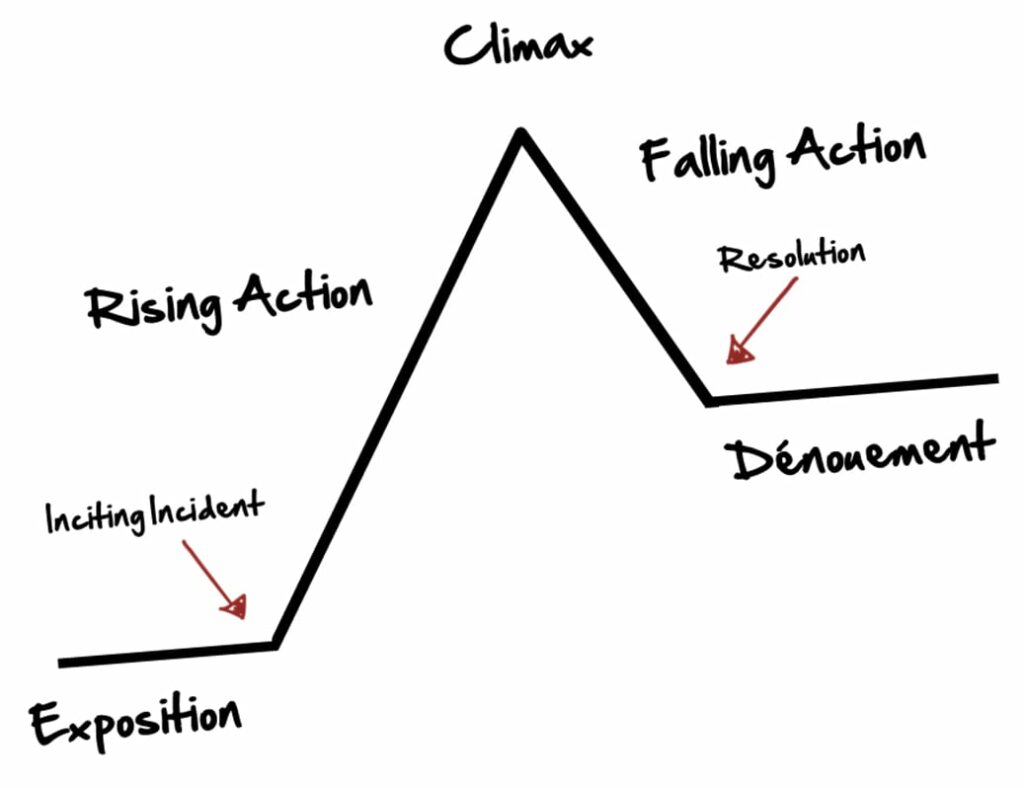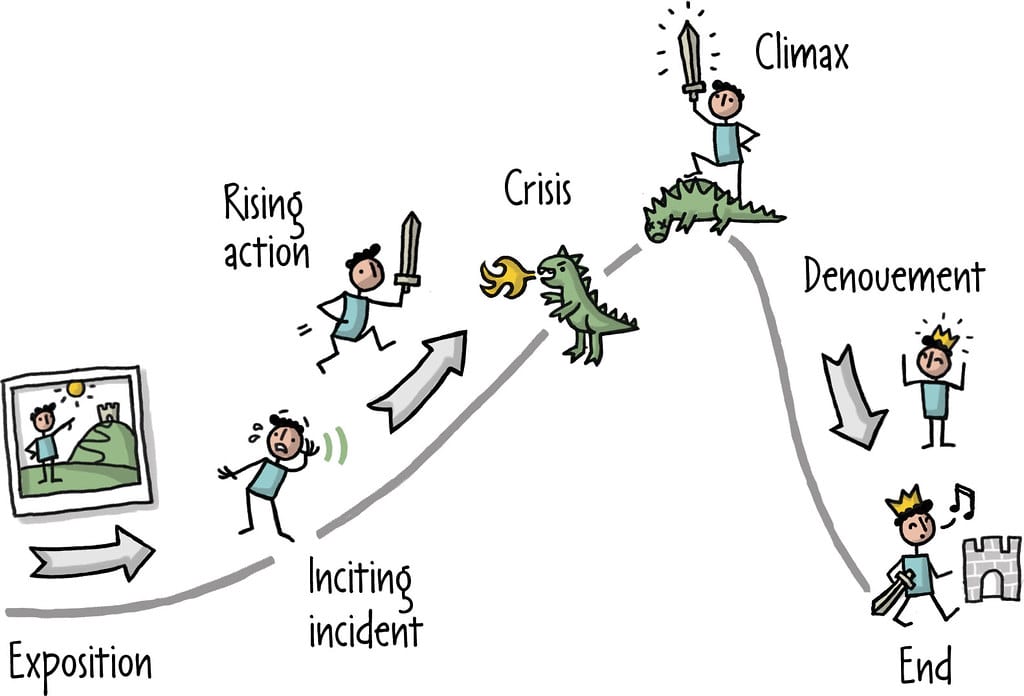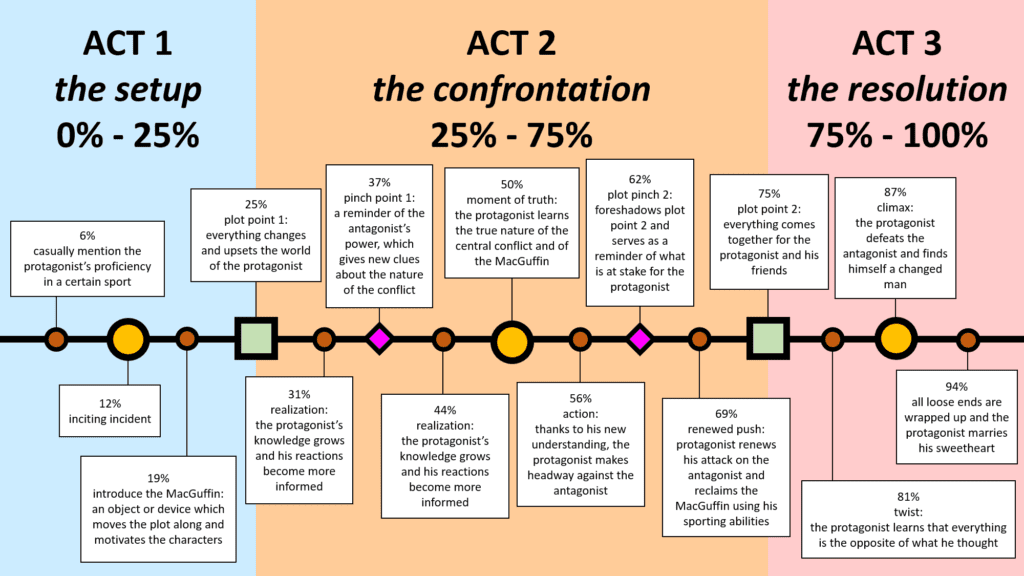An inciting incident is an event or action that sets off a chain of events in a story. It’s what drives the plot forward and ultimately leads to the protagonist’s goal being achieved, or not.
For example, when Luke Skywalker hears about Princess Leia’s capture by Darth Vader, this is an inciting incident because it determines his course of action for the rest of the movie.
INCITING INCIDENT
What Is An Inciting Incident?
To fully understand what an inciting incident is, we must first define the term.
An inciting incident is a turning point in the story that provides tension and conflict to propel the narrative forward.
This event can be anything from a character’s death, to a robbery, or even meeting someone new.
In every gripping story, there’s a moment that propels the protagonist into a new world of challenges and change: the inciting incident.
It’s the spark that ignites the plot, ensuring readers can’t help but turn the pages.
We’re diving into the craft of writing an inciting incident that’s both compelling and effective, setting the stage for a story that’s unforgettable.
Stick with us to learn the secrets behind crafting a beginning that’ll leave your audience craving more.
Understanding The Inciting Incident
When we jump into crafting stories, whether for the big screen or for the novel that’s burning a hole in our imagination, we recognize the inciting incident as the catalyst that sets everything in motion.
It’s crucial not to mistake this for a mere plot point; it is, in essence, the event that irrevocably changes the protagonist’s world and compels them into the narrative journey.
In The Hunger Games, Katniss Everdeen’s decision to volunteer in place of her sister primed audiences for a tale of survival and rebellion.
That pivotal moment resonates throughout the series, illustrating just how compelling the inciting incident must be to drive the story forward.
Here are some key aspects of a well-crafted inciting incident:
- It must disrupt the status quo,
- It should pose a question or problem that hooks the audience,
- The consequences of the incident must be significant and clear.
Consider Star Wars: Luke Skywalker’s discovery of the secret message is more than just an intriguing event.
It dismantles his mundane life on Tatooine and thrusts him towards his destiny.
It’s a shining example of how the inciting incident can also align with the hero’s call to adventure, solidifying the symbiotic relationship between character arc and narrative progression.
We often find that the most memorable inciting incidents are those that are unexpected yet inevitable looking back.
They are the seeds from which the entire plot grows and should never be underestimated in their power to captivate.
Each one plants a burning curiosity to see how the characters will navigate the new challenges they face, keeping us thoroughly engaged and invested in their journey.
Why The Inciting Incident Is Essential In Storytelling
The inciting incident is the spark that ignites the plot of a story.
It’s what sets everything in motion and hooks the audience’s attention.
Without it, a narrative lacks direction and fails to engage viewers on a fundamental level.
In terms of filmmaking, this moment translates to a visual promise of the unfolding drama and adventure, ensuring that the audience is committed to the journey ahead.
Creating a compelling inciting incident isn’t just a matter of crafting an event.
It involves establishing emotional stakes and laying the groundwork for character development.
Consider The Matrix – Neo’s encounter with the red and blue pills is iconic because it poses a profound choice that resonates with the viewers on multiple levels.
This is where the audience becomes invested in the protagonist’s decision and its consequences.
A well-executed inciting incident elevates a film by:
- Propelling the protagonist out of their comfort zone,
- Introducing the central conflict of the story,
- Creating a sense of urgency and intrigue.
In the realm of storytelling, consider the inciting incident your first impression – it has to be strong, clear, and memorable.
Take for instance Star Wars, where the acquisition of the Death Star plans immediately sets the stage for the epic conflict to come.
Audiences are drawn in by the promise of a larger narrative, eager to witness the unfolding tale of heroism against seemingly insurmountable odds.
Emphasizing its importance, the inciting incident shapes how the narrative is perceived.
It’s not simply about an isolated event but about the thematic echoes it creates throughout the story.
The Hunger Games presents a stark example of this, where the Reaping not only drives Katniss into the arena but also encapsulates the broader themes of sacrifice and oppression that pervade the narrative.
The inciting incident is a critical component of storytelling.
It’s the launching pad for the protagonist’s journey and informs every subsequent action and reaction within the narrative arc.
Creating A Strong Inciting Incident
When crafting an inciting incident, impact is key.
It’s the dynamite that blasts the protagonist into uncharted territories and tests their mettle.
The event must be emotionally resonant.
Whether it’s the loss of a loved one or a call to adventure, the incident should deeply affect the protagonist, forcing them to make a pivotal decision.
Think about The Matrix.
Neo’s encounter with the truth of his reality is an inciting incident that alters his existence and the film’s direction.
In Star Wars, Luke Skywalker’s discovery of a mysterious message sets him on a path that will eventually shape his destiny and that of the galaxy.
Key elements to include when designing an inciting incident are –
- A scenario that disrupts the status quo,
- A decision that the protagonist must make.
These factors ensure the audience is hooked and eager to see what unfolds next.
We must establish stakes and urgency.
The protagonist’s world has changed; their response must reflect the gravity of the situation.
Incorporating a challenge or a problem that the protagonist cannot ignore is vital.
This is the fuel for the narrative engine that keeps the story moving forward.
Remember, the more compelling the inciting incident, the more engaged the audience will be.
Our goal is to create a domino effect where the initial push is so strong it keeps the viewers invested through to the very end.
Identifying The Purpose Of The Inciting Incident
Having established that inciting incidents are pivotal, we now jump into their purposes within the narrative arc.
These events have particular tasks in storytelling – they serve as the fulcrum upon which the entire plot pivots.
First and foremost, an inciting incident introduces the central conflict.
It’s typically an event or decision that thrusts the protagonist into the story’s main action.
For example, in The Matrix, Neo’s choice to take the red pill.
It is also essential that the inciting incident sets the tone for what follows.
Whether through action-packed sequences or emotional dialogue, it telegraphs to the audience the genre and pace of the movie.
The event should align with the film’s overall mood and direction.
In crafting the inciting incident, consider these purposes:
- Unveiling the protagonist’s goals and motivations,
- Triggering the character development journey,
- Laying the groundwork for later plot points and twists.
By including these elements, audiences can fully appreciate the narrative’s stakes.
They become invested in the protagonist’s journey.
This investment is critical as it keeps them engaged with the unfolding story.
Another key purpose is to foreshadow future challenges and hurdles.
These early indications prime viewers for the evolution of the plot.
They set expectations that urge the audience to look forward to how events will unfold.
Finally, the inciting incident often signifies a point of no return.
The characters can’t revert to their old lives due to the events set in motion.
This irreversible change stokes curiosity about how they’ll adapt and grow as they’re pushed out of their comfort zones.
As we jump deeper into the mechanics of a powerful inciting incident, it’s clear that understanding its purpose isn’t just important; it’s essential for gripping storytelling.
Each component of the incident must be meticulously designed to carry the weight of these varied roles, ensuring that the audience is locked in for the entire ride.
Craft Techniques To Make Your Inciting Incident Stand Out
Establishing the right hook can be the difference between captivating your audience and losing their attention.
Memorability is key – your inciting incident should linger in the minds of your viewers long after they’ve moved on from the scene.
To achieve this, it’s crucial to amplify emotional stakes.
If the audience cares deeply about the characters, the impact of the inciting incident will be magnified tenfold.
Consider the heart-wrenching separation of Carl and Ellie in Up – it’s not just eventful, it’s emotionally charged.
Another tactic is to subvert expectations.
Audiences think they know what’s coming next, but a clever twist can leave them both surprised and eager to see what happens.
The sudden appearance of Tyler Durden in Fight Club is a classic example of an inciting incident that flips the script.
We understand that timing also plays a pivotal role.
Revealing the incident either too early or too late in the narrative can disrupt the story’s flow.

Instead, find the sweet spot where the audience has just enough information to understand the significance of what’s unfolding.
Here are a few methods to make your inciting incident pop:
- Offer a unique situation that hasn’t been seen before,
- Embed meaningful symbolism that will pay off later in the story,
- Create intriguing questions that demand answers.
It’s advantageous to use a strong visual or auditory element to make the moment stand out.
A striking image or a powerful line of dialogue can etch the incident into your viewers’ memory.
The whispering of “Rosebud” in Citizen Kane provides an auditory anchor that viewers can’t easily shake.
To maintain the momentum, ensure that the inciting incident is directly tied to the character’s growth and the story’s thematic essence.
When every aspect of the story feels intentional and connected, the inciting incident becomes more than just a plot point; it transforms into the driving force of the narrative.
How To Write An Inciting Incident – Wrap Up
We’ve equipped you with the tools to craft a powerful inciting incident that will captivate your audience from the start.
Remember, it’s the spark that ignites the narrative engine, propelling your story forward with momentum and purpose.
By embedding emotional depth, playing with expectations, and ensuring relevance to your character’s journey, you’ll create a memorable moment that resonates throughout your tale.
Now it’s your turn to take these strategies and weave an inciting incident that not only stands out but also stands the test of time.
Happy writing!
Frequently Asked Questions
What Is An Inciting Incident In Storytelling?
An inciting incident is the event that sets the main plot in motion by introducing the central conflict, defining the protagonist’s goals and motivations, and creating a point of no return.
Why Is The Inciting Incident Important?
The inciting incident is crucial because it engages the audience, begins character development, sets the tone, foreshadows challenges, and is key to a gripping narrative.
How Can You Make An Inciting Incident Stand Out?
You can make an inciting incident stand out by amplifying emotional stakes, subverting expectations, using the right timing, employing unique situations, meaningful symbolism, and strong sensory elements.
When Should The Inciting Incident Occur In A Story?
The inciting incident should occur early enough to establish the story’s direction but after enough setup to understand its significance and impact on the protagonist.
How Does The Inciting Incident Relate To Character Development?
The inciting incident is closely tied to character development, as it often triggers the growth and changes that the protagonist undergoes throughout the story.
Can The Inciting Incident Include Symbolism?
Yes, including meaningful symbolism in the inciting incident can add depth and foreshadow elements of the story, thus offering a richer experience for the audience.






